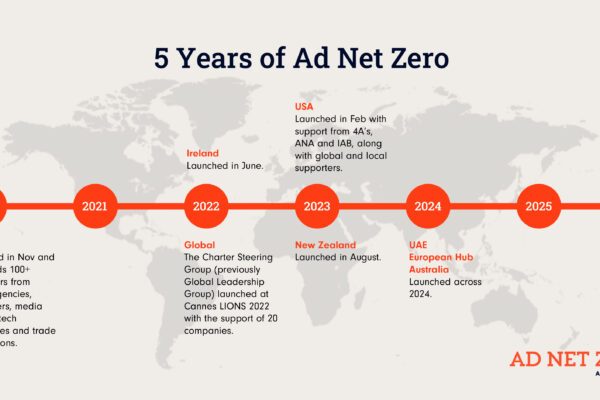UK & EU Environmental Legislation- 16th January
Following our Q1 Training focused on environmental legislation across the UK, EU & US, and understanding greenwashing and the regulation around this in the UK & EU, we wanted to outline a summary of key quotes and learnings from the sessions. We heard from industry experts including Ines Talavera de la Esperanza at IAB Europe, Konrad Shek at Credos, Alison Pepper at the 4A’s, and Justine Grimley at the ASA. Here’s what they had to say…
On the importance of UK environmental regulation, Konrad Shek from Credos & The Advertising Association enforced that “These disclosures are really important because they give information, material climate-related financial information, which can help investors make decisions, particularly as we move towards a low carbon economy”. He strongly recommended delving into the FRC’s strategic report (linked below), which “serves as a best practice statement to help companies prepare their own strategic reports”. Looking to the future, Konrad mentioned the UK Sustainability Disclosure Standards as the “third global standard [for environmental regulation] alongside the US and EU [standards]”, with expectations for ‘the Secretary of State to endorse these standards by sometime mid this year [2024], and this will be the key standard going forward”.
Please find Konrad Shek’s deck here, which outlines current and upcoming UK environmental legislation. Here are links to resources Konrad mentioned in the session too:
Reporting requirements
Climate-related financial disclosures for companies and limited liability partnerships (LLPs)
Strategic report
Guidance on the Strategic Report
Content of the strategic report
UK SDS
UK Sustainability Disclosure Standards
Introduction to ISSB and IFRS Sustainability Disclosure Standards
Moving onto EU regulation, Ines Talavera de la Esperanza at IAB Europe stated that the 2020 EU Taxonomy Regulation “comes from the finance framework on how to best direct all EU investment towards green bonds and more sustainable investment products” and should be considered “the base for almost all other regulation” discussed in the session. Under this regulation, business activities can be classified as ‘sustainable’ or not, depending on their compliance with any of the 4 conditions set out in the Taxonomy Regulation.
Underpinned by this classification system, Ines stated that the other regulations, such as CSRD, are “set up with the goal for more transparency when it comes to emissions”. Larger companies listed on the regulatory market will be the first to be affected by CSRD, delivering their first reports in compliance with this regulation in 2025, followed by unlisted large companies in 2026, listed SMEs in 2027, and non-EU companies and subsidiaries in 2029.
On a broader level looking forwards, finalisation of the Green Claims Directive will await until the next EU term, EU Parliamentary elections will be held in June 2024. One scenario that The IAB Europe expects in the new EU term are “proposals for regulations that go beyond the one’s presented now [in this session]” with potential for the Green Claims Directive to not only cover B2C but also B2B communications”, and legislation that would make “smaller companies comply with these regulations”.
Please find Ines Talavera de la Esperanza’s deck here, which outlines current and upcoming EU environmental legislation.
You can find a recording of this session on our YouTube channel here.
Here are links to resources Ines mentioned in the session:
CSRD
Timeline for the Corporate Sustainability Reporting Directive
EFRAG’s DUE PROCESS PROCEDURES EU SUSTAINABILITY REPORTING
#DeloitteESGNow — Frequently Asked Questions About the E.U. Corporate Sustainability Reporting Directive
CSDDD
Corporate sustainability due diligence
Green Claims Directive
Understanding the proposed EU Green Claims Directive
US Legislation – 23rd January
After a wonderful introduction from John Osborn, Director of Ad Net Zero US, we heard from Alison Pepper who confirmed that the “EU & the UK are further along the legislative path than the US”. This is partly due to the legislative gridlock created by division within “the [political] parties themselves” that are “making it very difficult to move any legislation in Congress” right now.
However, despite any potential political upheaval, Alison stated that the Inflation Reduction Act (IRA), a relatively recent piece of environmental legislation in the US, is likely to continue to be funded in the future despite political upheaval and the partisanship nature of environmental legislation and regulation in the US. This is due to the fact that much of the money to further the IRA’s goals has been flowing to conservative states, and it’s likely that those states will push to continue or expand the funding.
Commenting on the proposed SEC climate regulations calling for Scope 1, 2, and 3 reporting as well as related climate financial impact disclosures, Alison said the SEC is being “extremely cautious in putting out these regulations” due to the likelihood of these regulations being litigated. It’s very possible the SEC will release “a very trimmed down version (of the regulations) that may eliminate scope 3 (reporting requirements) entirely”.
Taking a look at what the different states are focusing on when it comes to environmental legislation, Alison’s assessment was that “most of the bills around environmental initiatives we’re seeing in the states have to do with disaster mitigation [floods, fires, drought]” demonstrating a “leaning toward the mitigation side rather than the prevention side right now, but hopefully we will start to see more bills focused on prevention as opposed to mitigation”.
Alison also spoke on a host of other topics, including the ‘Chevron Deference’, a recent Supreme Court case that could have a disastrous impact on creating and enforcing environmental regulation in the US, so that’s a key one to watch!
Please find Alison Pepper’s deck here, which outlines current and upcoming US environmental legislation. You can watch a recording of this session on our YouTube channel here.
Greenwashing in the UK & EU – 30th January Session
From Justine Grimley at the ASA, whose guidelines “reflect and supplement the law”, we heard that as “consumers are looking to make more sustainable choices, businesses are adapting to tap into those opportunities, and to change to meet their climate goals, but as we know, along with that, comes the risk of so-called greenwashing”.
In this “complex area of marketing”, Justine discussed the ASA’s approach, “looking systematically at themes identified by the Climate Change Committee, those areas where the greatest amount of behavioural change is needed.”
When asked about responsibility being split between client’s vs agencies when it comes to environmental claims, Justine confirmed that “currently the ASA holds marketers responsible for their ad claims” while in the EU Alexis outlined that “the agency will always bear the responsibility in terms of acting on behalf of the client” and there will be an increase in legal liability under the stricter EU regulation coming in.
Justine’s advice for marketer’s working on campaigns making environmental claims included:
• Making use of the ASA’s bespoke ‘Copy Advice’ service (which offers a free 24-hour turn around!). You can approach them with a claim, a finished campaign or article, or a project that is in the works, which their experts will check against the CAP Code rules and help you to minimise any risk of greenwashing.
• Try not to use absolute claims, as, if you do, then “a very high level of evidence is going to be required” to qualify your claims.
• Look through the eyes of a consumer, being aware that they will likely not be versed in technical or jargon-filled environmental claims.
Please find Justine Grimley’s deck here, which outlines how to navigate environmental communications rules within the UK, and takes a deeper dive into the ASA’s rules and guidance.
You can find a recording of this session on our YouTube here.
Here are links to the resources Justine mentioned too:
The ASA Website
The ASA Resources and Advice – Bespoke Copy Advice
Green Claims Code – get your green claims right
Climate Change Committee COP28 outcomes must lead to acceleration of action in the UK




